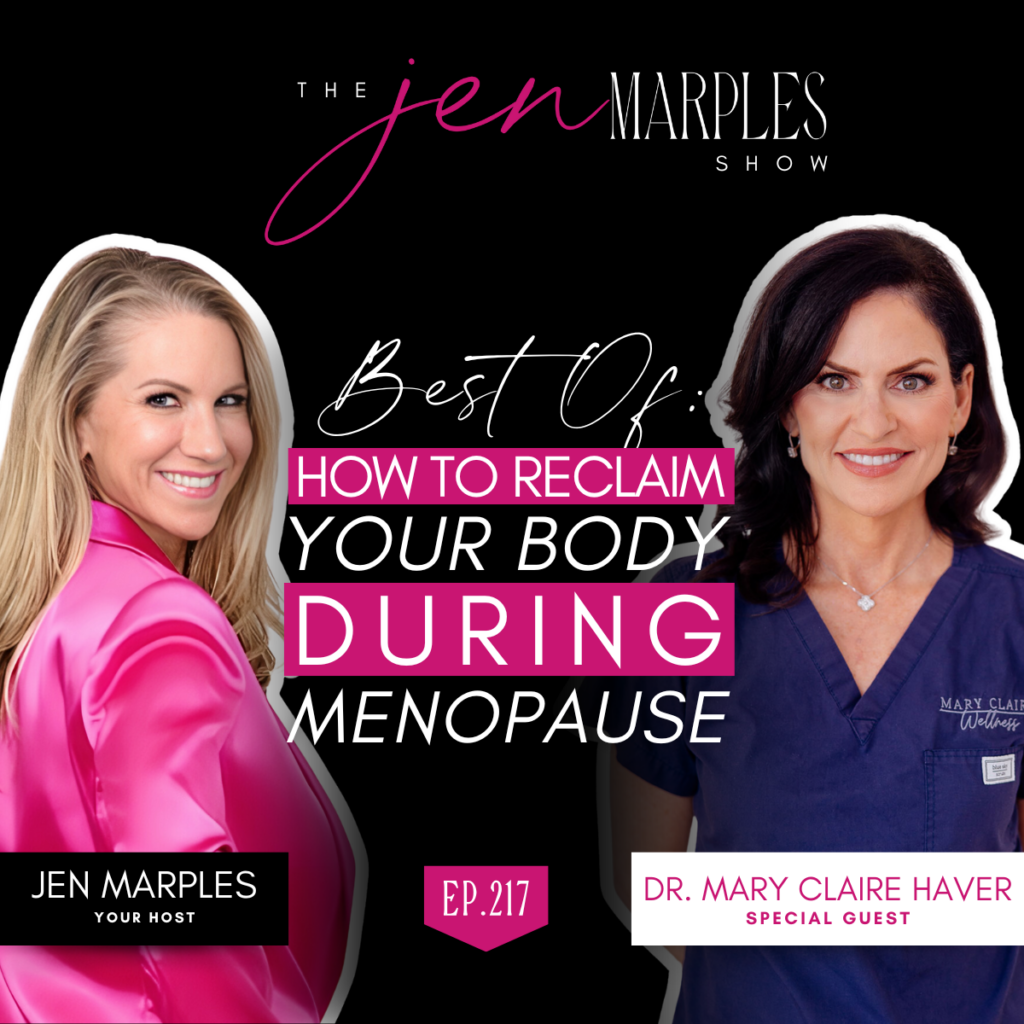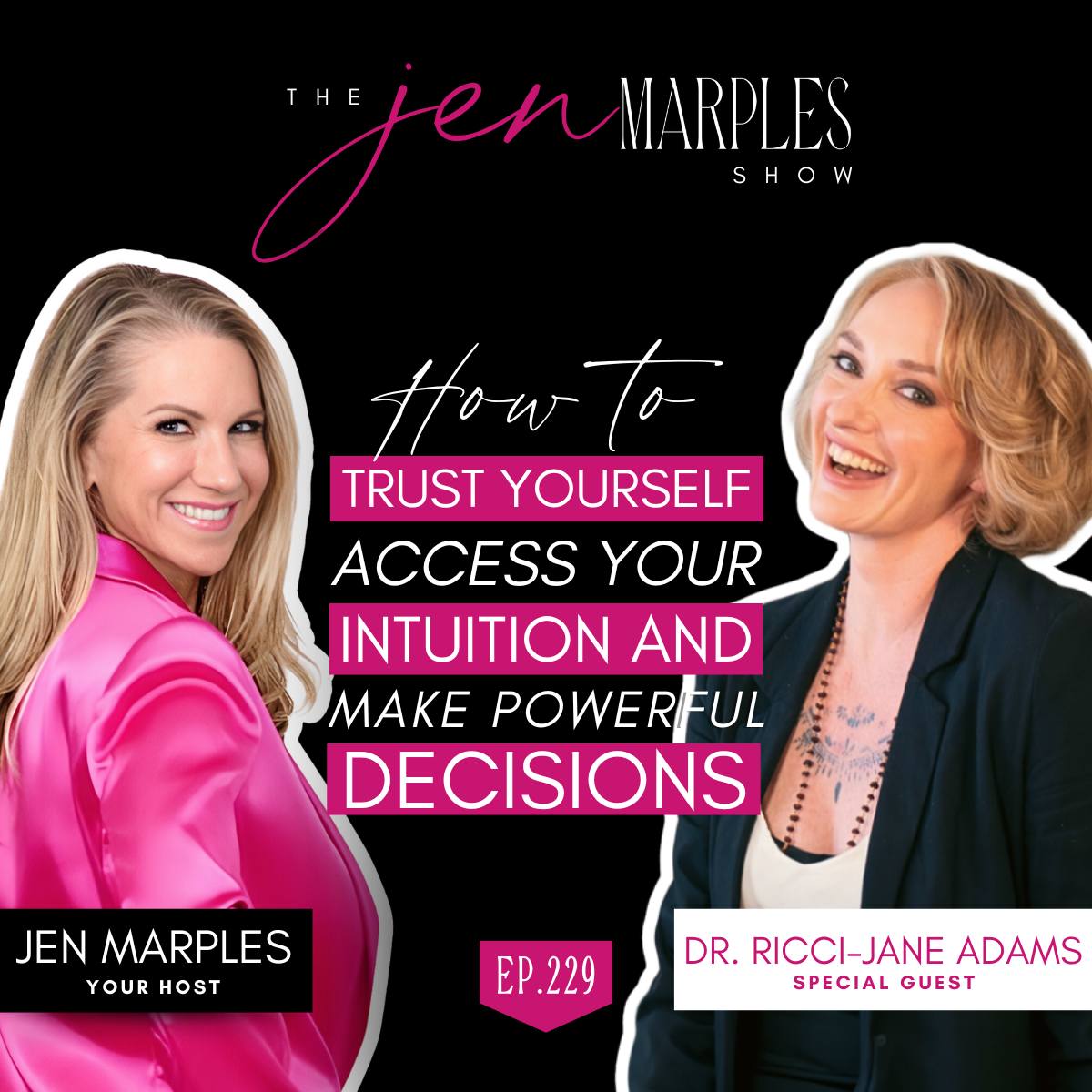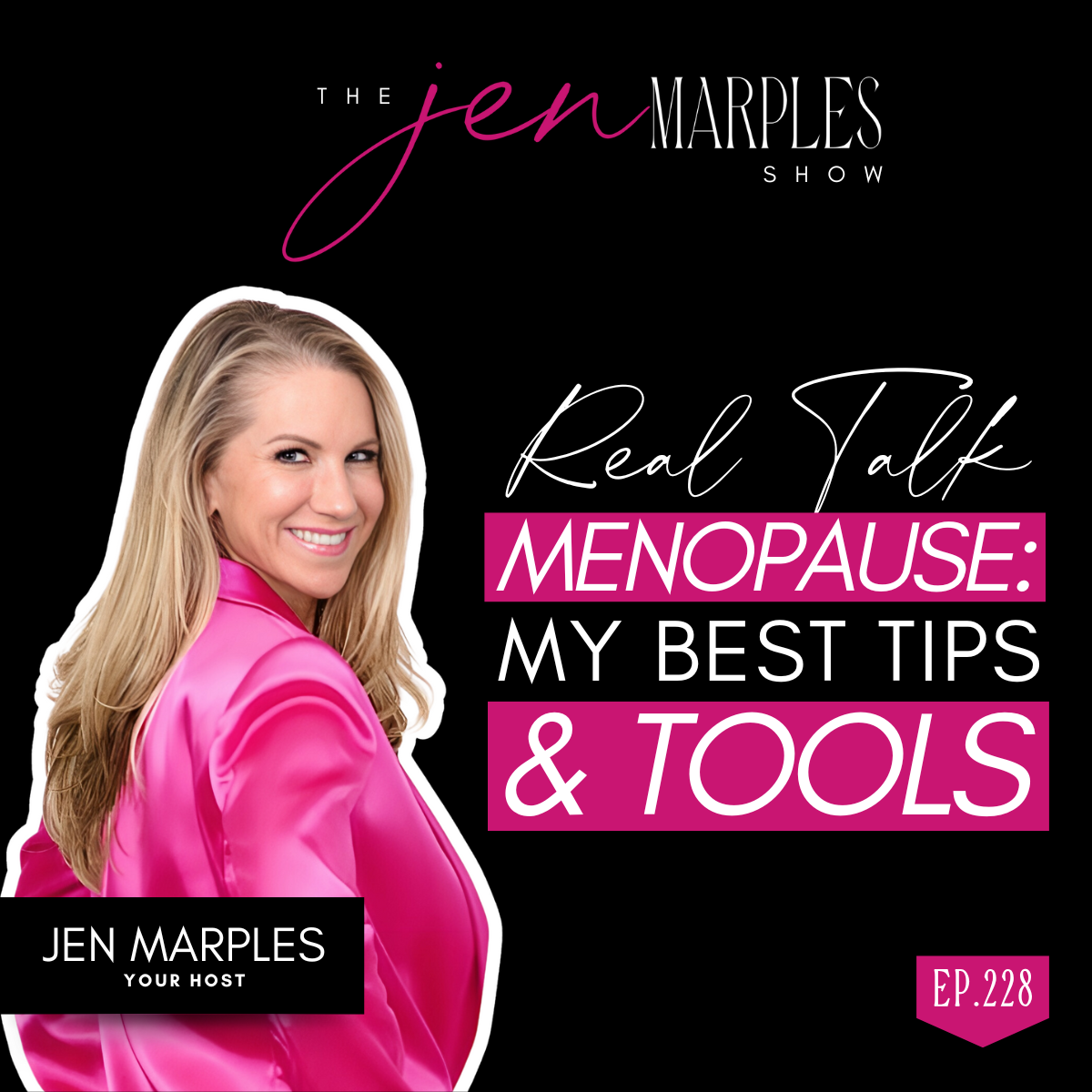
Another Best Of Episode with Dr. Mary Claire Haver as this episode is TOO GOOD not to share again!
If you’ve been gaslit by healthcare providers who dismiss your symptoms as “just getting older,” this episode will validate EVERYTHING you’re experiencing and give you the tools to reclaim your power.
Brain fog? Unexplained weight gain? Feeling invisible in a healthcare system that doesn’t get it? You are not alone, and you are NOT imagining it.
Dr. Mary Claire Haver is board-certified in Obstetrics and Gynecology and is a Certified Culinary Medicine Specialist from Tulane University. She is also a Certified Menopause Specialist through The Menopause Society. In 2021, she opened Mary Claire Wellness, a clinic dedicated to caring for menopausal patients. Her educational background and her own experience led Dr. Haver to develop the national bestselling book and online program, The Galveston Diet, a three-pronged lifestyle plan that encourages fuel refocusing, intermittent fasting, and anti-inflammatory nutrition to manage hormonal symptoms, stabilize weight, and revitalize the body as it ages to provide benefits that will last a lifetime. Dr. Haver’s second book, The New Menopause, will be released in April 2024.
What You’ll Learn:
- Nutrition & Supplements That Work:
- Exact nutrients your menopausal body needs and how much
- Why your old diet stopped working
- Vitamin D, Turmeric, Probiotics, and Creatine – what’s worth it
- The truth about sugar, alcohol, and inflammation
- Exercise & HRT:
- Muscle-building strategies to prevent osteoporosis
- Hormone replacement therapy without the fear-mongering
- Exercise that works WITH your changing body
- The 70 Symptoms No One Talks About:
- From frozen shoulder to burning tongue to sexual dysfunction
- Why your vertigo, tinnitus, and dry skin might all be connected
- Real solutions for symptoms you didn’t know were menopause-related
This isn’t about surviving menopause – it’s about using this transition as your launching pad for the most empowered, healthy, and vibrant chapter of your life!
Dr. Mary Claire Haver Says: You’re Not Too F***ing Old! To do anything!
Stepping into midlife can bring a mix of emotions. For many women, it’s a time of newfound confidence and clarity, a period where you finally feel empowered to live life on your own terms. But it also brings a big change: menopause. This natural shift can sometimes feel overwhelming, bringing with it unexpected symptoms that can impact your daily life and make you feel like you’re losing your footing. You might wonder what’s happening to your body, or why you’re experiencing things no one ever talked about. This article is for every woman navigating this unique phase, offering clear, actionable steps to not just manage but to thrive through menopause. We’ll explore how to optimize your health, boost your energy, and regain control, all inspired by the expert insights of a leading women’s health specialist.
Are You Ready for a Midlife Health Revolution?
You might be feeling a bit lost right now, experiencing things like brain fog, unexpected weight changes, or a general sense of being off. Perhaps you’ve tried different approaches without much success, or maybe you’re simply overwhelmed by all the conflicting information out there. This guide from Dr. Mary Claire Haver is for you if you’re ready to take charge of your health, understand what’s happening in your body, and actively work towards a vibrant future. It’s about building a strong foundation for the second half of your life, ensuring you have the energy and vitality to pursue your dreams.
What You’ll Need:
- An open mind and a willingness to learn.
- A commitment to making small, consistent changes.
- The understanding that personalized medical advice is always best. You should always talk to your doctor before trying new things.
Your Step-by-Step Guide to Menopause Wellness with Dr. Mary Claire Haver
Step 1: Rethink Your Plate – Fueling Your Body for Midlife
When it comes to eating, it’s easy to fall into the trap of thinking “healthy” means simply avoiding “bad” foods. But for women in menopause, it’s more about understanding how food affects inflammation and ensuring you’re getting enough of the right nutrients. Many women are unknowingly missing out on key elements that support their health during this time. We often don’t get enough fiber, and too much added sugar can contribute to issues like belly fat and insulin problems. It’s time to shift your focus from vague healthy eating to a more targeted, anti-inflammatory approach.
The key to good nutrition in menopause is to focus on foods that fight inflammation. This means filling your plate with things like lean meats, lots of vegetables, fruits, legumes, seeds, and nuts. These foods aren’t just rich in fiber; they also contain many other good things like vitamins and minerals that work together to keep you healthy. Aim for at least 25 grams of fiber each day. Also, be very mindful of added sugars. These are sugars put into processed foods or drinks, like alcohol. Try to keep your added sugar intake under 25 grams per day. Limiting added sugars can significantly help reduce belly fat and improve how your body uses insulin.
- Prioritize Fiber: Aim for 25 grams or more of fiber daily through whole foods like nuts, seeds, legumes, fruits, and vegetables.
- Limit Added Sugars: Keep added sugars to under 25 grams per day to help reduce visceral fat and improve insulin sensitivity.
- Embrace Anti-Inflammatory Foods: Focus on lean meats, vegetables, fruits, legumes, seeds, and nuts to naturally fight inflammation.
Step 2: Smart Supplementation – Filling Your Nutritional Gaps
Dr. Mary Claire Haver gives us some great tips on using supplements to give our bodies the proper nutrients. Even with a great diet, it’s common for women in menopause to have some nutritional shortcomings. For example, a large number of women are very low on Vitamin D, which is essential for many body functions. You might also hear a lot about different supplements like probiotics or turmeric, and it can be hard to know what’s truly helpful and what’s just hype. Understanding which supplements can genuinely support your body during this time is crucial for maintaining overall health and preventing common issues.
Consider adding specific supplements to your routine to address common deficiencies. Vitamin D is a big one; many women can safely take around 4000 international units daily. Omega-3 fatty acids are also powerful antioxidants that can be beneficial. Turmeric, especially when combined with black pepper extract, can act as a natural anti-inflammatory and may help with joint pain and belly fat. Probiotics are important for gut health, and while you can get them from foods like yogurt and kombucha, a supplement can be helpful if your diet falls short. Magnesium is another mineral that many women can benefit from, but it’s best to track your intake and only supplement to fill gaps. Be careful with calcium supplements, as getting it through food is usually better to avoid kidney stones and other potential issues.
- Consider Vitamin D: Many women are deficient; 4000 IU daily is a common safe dose.
- Explore Omega-3s and Turmeric: These can act as powerful antioxidants and anti-inflammatories.
- Support Gut Health with Probiotics: Get them through fermented foods or a high-quality supplement.
- Magnesium When Needed: Track your intake and only supplement to cover any shortfalls.
- Prioritize Food for Calcium: Aim to get calcium from your diet rather than supplements to reduce risks.
Step 3: Fasting with Finesse – Protecting Your Muscle Mass
Fasting has gained a lot of attention, with different ideas about how long or often you should do it. While fasting can offer benefits like lowering inflammation, extended fasting, especially for women in midlife, can have a downside: muscle loss. As you go through menopause, your body naturally starts to shed muscle faster than before, a process called sarcopenia. This muscle loss can be significant and impact your strength and overall health as you age. Dr. Mary Claire Haver says it’s crucial to approach fasting in a way that supports your muscle health, rather than harming it.
While fasting can be good for lowering inflammation and insulin levels, especially with a 16-hour fasting window and an 8-hour eating window, be cautious with longer fasts. When you fast for extended periods or drastically cut calories, you might lose weight, but about half of that loss can be muscle, not just fat. Building muscle back takes much longer than losing it, so protecting your existing muscle is super important. The goal isn’t just a number on the scale; it’s about maintaining strength and preventing frailty as you get older. Focus on eating enough calories and protein during your eating window to keep your muscles fed and strong.
- Moderate Fasting: Consider a 16:8 fasting schedule for lowering inflammation.
- Avoid Extended Fasting: Long fasts can lead to significant muscle loss, which is detrimental in midlife.
- Prioritize Muscle Preservation: Focus on getting enough calories and protein during your eating window to support muscle health.
Step 4: Building Your Muscle Bank – Exercise for Longevity
As we’ve touched upon, muscle loss is a real concern in menopause. You might notice changes in your strength or how quickly you recover from minor illnesses. Many people think of exercise simply for weight loss or looking good, but its role in midlife shifts dramatically. It becomes a critical tool for building a “muscle bank” that protects you against the inevitable challenges of aging, like falls, injuries, and even severe illness. Without a focus on strength, you risk becoming frail and less independent later in life.
To prevent muscle loss and support bone density, incorporating resistance training into your routine is vital. This means lifting weights or doing exercises that challenge your muscles to grow stronger. Don’t be afraid to lift heavy enough to truly challenge your muscles, going to the point of failure to stimulate growth. Combining resistance training with adequate protein intake and a supplement called creatine can make a significant difference. Creatine can help promote muscle mass and bone density, and studies suggest 5 grams per day is a good starting dose, sometimes with a higher loading dose for the first couple of weeks. Consistency in your exercise routine is key to seeing lasting results.
- Embrace Resistance Training: Lift weights or perform exercises that challenge your muscles to stimulate growth.
- Lift Heavy: Push your muscles to their point of failure to encourage strength gains.
- Consider Creatine: A 5-gram daily dose of creatine, combined with resistance training and enough protein, can boost muscle and bone density.
- Prioritize Protein: Ensure adequate protein intake to support muscle building and repair.
Step 5: Understanding Hormone Therapy – A Personalized Approach
Hormone changes during menopause can bring a wide range of symptoms, from brain fog and difficulty focusing to hot flashes and mood swings. You might have heard scary stories about hormone therapy from years ago, leading to confusion and fear. It’s crucial to understand that hormone replacement therapy (HRT) has evolved, and for many women, it can be a safe and incredibly beneficial option when done correctly. The goal is to replace the hormones your ovaries used to make, providing relief from symptoms and offering long-term health benefits.
When considering hormone therapy, it’s all about finding what’s right for you based on your personal health history. The main hormones often replaced are estradiol (what your ovaries primarily made) and progesterone (which helps with sleep and anxiety). If you have a uterus and are taking estrogen, you must also take progesterone. Don’t overlook testosterone, a female hormone that significantly declines during menopause. It’s incredibly helpful for things like brain fog, muscle mass, and bone density. Studies show that starting hormone therapy within five years of menopause can reduce your risk of dementia and cardiovascular disease. While there might be initial side effects like bloating or emotional changes, these can often be adjusted by modifying your dosage.
- Personalized Approach: HRT is an individual decision based on your medical history and needs.
- Key Hormones: Common options include estradiol, progesterone, and testosterone.
- Testosterone Benefits: Can be beneficial for bone density, muscle mass, and cognitive function, especially for brain fog.
- Brain Health Protection: Starting HRT early (within five years of menopause) can significantly reduce your risk of dementia.
- Adjusting Side Effects: Bloating or emotional changes with HRT can often be managed by adjusting dosage.
Your Vibrant Midlife Awaits!
Stepping into midlife and navigating menopause is a unique journey for every woman, but it doesn’t have to be a struggle. The big idea here is empowerment – understanding what’s happening in your body and taking proactive steps to support your health. This phase offers an incredible opportunity to prioritize yourself, embrace new possibilities, and live your most vibrant life.
To implement these ideas successfully, start by reviewing your current nutrition habits and identifying areas for improvement, especially regarding fiber and added sugars. Then, consider discussing targeted supplementation, like Vitamin D and creatine, with your doctor to fill any gaps. Rethink your exercise routine to prioritize resistance training and muscle building, and finally, have an open conversation with your healthcare provider about whether hormone replacement therapy is a good option for your individual needs. Remember, you are not too old to claim all that you desire and live your best life!
Learn more about Jen Marples at https://www.jenmarples.com
Want to work with Jen? Book a complimentary 20-minute call HERE.
Follow Jen @jenmarples on Instagram, LinkedIn, TikTok and YouTube
Subscribe to Jen’s Newsletter
Unedited AI Transcript Here
CONNECT WITH DR MARY CLAIRE HAVER:




